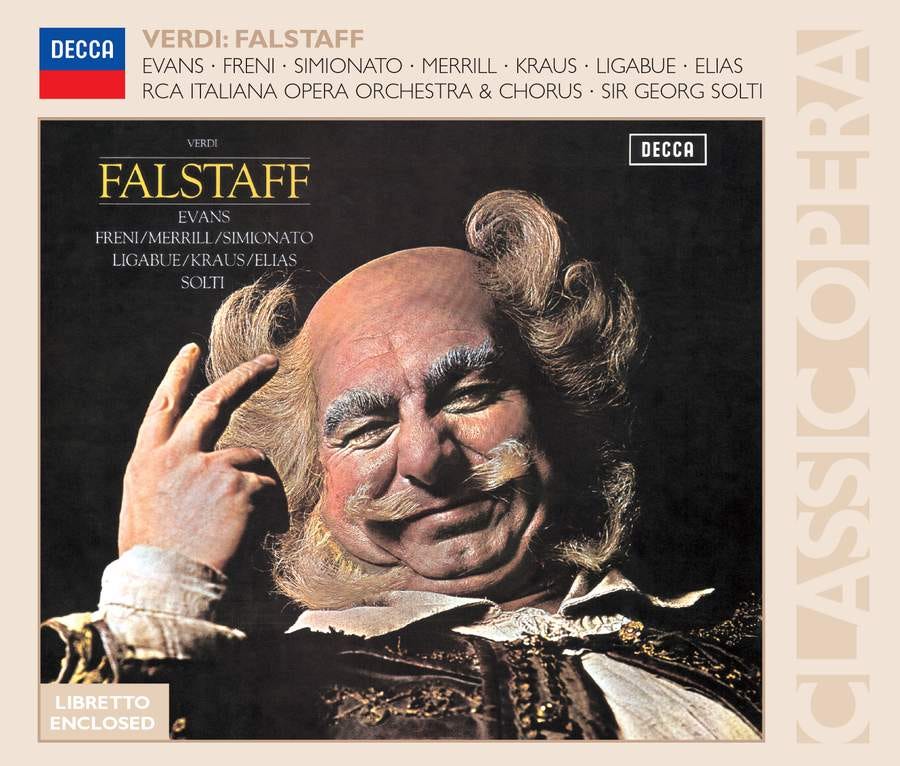Opera Daily 🎶 — My Favorite Falstaff
This week's edition of Opera Daily features a recording of Giuseppe Verdi’s Falstaff w/ Geraint Evans, Giulietta Simionato, Rosalind Elias, Robert Merrill, Mirella Freni, and Alfredo Kraus
👋 Hello to the new Opera Daily subscribers who have joined us this week. A reminder that you can check out the complete Opera Daily archives and the playlist on YouTube for more selections. If you were forwarded this email by a friend, join us by subscribing here:

The story is taken from Shakespeare, but it has an Italian soul.
(Click this link to read the full post in your browser)
Today we are listening to one of my favorite recordings of Giuseppe Verdi’s Falstaff from 1974.
Falstaff was the last opera composed by Verdi (with a libretto by Arrigo Boito) before his death in 1901. The music of this opera is very different from his past compositions.
For starters, there’s no overture. There are also no “closed” numbers. Verdi composed the opera without traditional divisions between recitative, aria, and ensembles, creating a “through composed” score that is continuous from start to finish—keeping up with the quick pace of a Shakespearean play.
In Falstaff, which takes place in Windsor, England, at the end of the 14th century, the title character is running out of money and looking for a quick fix. He sets his sights on two wealthy, married women and tries to court them by writing them love letters. The women (Alice Ford, soprano, and Meg Page, mezzo-soprano) catch on to his plan and teach him a lesson (with the help of the Fords’ teenage daughter, Nannetta). Throughout the opera, Falstaff’s grand plan falls apart, and in the end, he gets what he deserves.
🎧 Listening Example (2 minute listen): Soprano Mirella Freni and Tenor Alfredo Kraus sing Nanetta and Fenton’s Duet “Pst, pst, Nannetta” from Act 1 of Verdi’s Italian opera Falstaff
As with almost every musical idea in Falstaff, lovely interludes like this one don’t last long.
🎧 Listening Example (4 minute listen): Soprano Mirella Freni sings Nannetta’s aria “Sul fil d’un soffio etesio” (“On the breath of a fragrant breeze, fly nimble spirits”) from Act 3 of Verdi’s Italian opera Falstaff
Falstaff was the last opera written by Verdi when he was 79 years old, and he was writing for only his pleasure, with no commission, no performance in mind. When he finished it, he felt that it would be his last work and that his work was complete. The joy and beauty contained in just this aria is proof of that.
Nannetta, disguised as the Queen of the Fairies, summons her followers who attack the terrified Falstaff, pinching and poking him until he promises to give up his ways.
🎧 Listening Example (3 minute listen): Falstaff begins his final fugue “Tutto nel mondo e burla” (“Everything in the world is a jest...”) and all the characters join in for this ensemble ending from Act 3 of Verdi’s Italian opera Falstaff
The final fugue, which is as complex musically as it is in its philosophical musings, might be one of the reasons Falstaff is often viewed today as more “intellectual,” despite being a comedy.
Falstaff, who fancies himself a trickster, has himself been tricked. Everything winds up happily ever after, and the ensemble sings a grand fugue on a text that translates to “the whole word is a joke.”
Falstaff is a larger-than-life, self-involved character that teaches us a lesson in the end by learning to laugh at ourselves, with the famous line:
Everything in the world is a jest. . . Every mortal laughs at all the others. But he who laughs last, laughs best.
Thank you for reading (and listening), and feel free to hit reply with feedback. I would love to hear from you.
Michele
PS. If you missed last week’s selection, I wrote about why I write this newsletter!
❤️ If you enjoyed this selection, please hit the heart to like it (and share it too!)


The essence of FALSTAFF was the profound contribution by Arrigo Boito and his libretto for Verdi. On my copy of the Ricordi manifest, Verdi and Boito receive equal billing. To not include Boito, and this extraordinary text is an oversight. Without Boito, there would never have been a FALSTAFF.
Certainly lively!